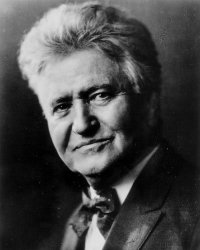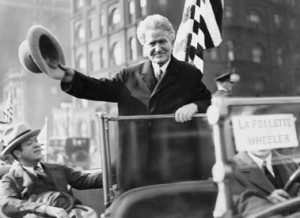 Meeting in Cleveland’s Municipal Auditorium on this day in 1924, the Conference for Progressive Political Action (CPPA) formally nominated the ailing Robert M. La Follette of Wisconsin for president by acclamation.
Meeting in Cleveland’s Municipal Auditorium on this day in 1924, the Conference for Progressive Political Action (CPPA) formally nominated the ailing Robert M. La Follette of Wisconsin for president by acclamation.
Gathering on the 148th anniversary of the Declaration of Independence, the CPPA convention was a sight to behold, a seemingly “strange and timeless mixture of old and new,” as historian Kenneth C. MacKay keenly observed.
The CPPA’s two-day gathering of farmer, labor and liberal groups attracted more than 10,000 people to its opening session on July 4.
In addition to delegates from the Farmer-Labor and Socialist parties, labor unions and the Committee of Forty-Eight — the four most influential groups within the CPPA — there were also delegates representing such diverse groups as the Food Reform Society of America, the National Unity Committee and the Davenport-based Ethical Society.
Almost every group imaginable was represented in Cleveland.
Students flocked in from most of the elite Ivy League schools in the East, joining others from Barnard, Vassar and Union Theological Seminary. But they weren’t the only young people in attendance. There was also a group from the Young People’s Socialist League, having hitch-hiked all the way from New York. Then there was Max Swiren, a member of the University of Chicago’s Liberal Club, and a personal friend of Nathan Leopold, who was awaiting trial with his accomplice and lover Richard Loeb in the brutal “thrill killing” of fourteen-year-old Bobby Franks earlier that year.
There were older delegates, too. Believing that La Follette’s nomination would be equally historic, Robert Springer, an 83-year-old delegate who had witnessed Abraham Lincoln’s nomination at Chicago’s famous Wigwam some sixty-four years earlier, borrowed money from a friend to make the 422-mile trip from the Old Soldiers’ Home in Milwaukee.
Seventy-year-old Jacob S. Coxey of “Coxey’s Army” fame also showed up, hoping the CPPA would adopt his proposal to abolish interest.
Then there was Elizabeth Goldstein of Greenwich Village — nobody quite knew how old she was — who arrived all alone, saying, “I’m like La Follette, I don’t need a party.”
In his keynote address, William H. Johnston, president of the International Association of Machinists and permanent chairman of the CPPA convention, asserted that the ranks of the progressive movement, fresh from a tremendous victory over the reactionary forces in the 1922 mid-term congressional elections, had swelled to five million citizens — “the mightiest political force ever assembled in our nation to fight unswervingly for truth, for justice and for freedom.”
Hailing La Follette as a “Tribune of the American People, their greatest spokesman and their most loyal defender,” Johnston, a former bass drummer for the Salvation Army, flayed both old parties and declared that it was time for the people to regain control of their government. “We are sick of the artificial distinctions between Republicans and Democrats,” he declared. “We are tired of voting for Tweedledee and Tweedledum. We want a clear cut issue between the reactionaries on the one side and the Progressives on the other.”
The Republicans, continued Johnston, had once again demonstrated their “appropriate stupidity” by nominating a pair of reactionaries while the Democrats, embracing a platform of “base expediency and unprincipled compromise,” had truly lived up to their party’s emblem — “the patient donkey.”
After listening to poet Edwin Markham’s long oration on “Lincoln, the Man of the People,” and New York congressman Fiorello H. La Guardia’s prediction that La Follette would be the next president of the United States, the delegates then heard from Peter Witt, Tom Johnson’s old protégé from Cleveland, who whipped the crowd into a frenzy with his attacks on the Republican “Babbitts,” the contented members of the party of greed described by novelist Sinclair Lewis in his bestselling 1922 commentary on the American middle class.
The delegates also listened to an impassioned address by William Pickens, an African-American graduate of Yale who read a message from the NAACP.

‘Fighting Bob’ and his running mate Burton K. Wheeler of Montana carried Wisconsin and came close to winning in Idaho, Minnesota, Montana, Nevada, North Dakota and South Dakota.
La Follette’s nomination was a mere formality. In fact, La Follette had already sent a letter accepting the CPPA’s endorsement on the afternoon of July 4 — the day before the resolution recommending his endorsement had even reached the floor of the convention.
Despite losing the battle for the immediate formation of a new party, the Socialists, led by labor lawyer Morris Hillquit, were the first to second La Follette’s candidacy. (The Socialist Party, meeting in Cleveland a few days later, enthusiastically endorsed La Follette and his platform by an overwhelming vote of 106 to 17.)
Hungarian-born Abraham Lefkowitz of the New York teachers union, representing the national Farmer-Labor Party, also gave a seconding speech. Lefkowitz, a longtime mover and shaker in the American Federation of Labor who later served as vice president of the American Federation of Teachers, was one of the original members of the five-man executive committee formed in Chicago in the summer of 1919 to create a national labor party, which eventually evolved into the national Farmer-Labor Party.
Lefkowitz was followed by aging feminist Harriet Stanton Blatch, a member of the CPPA’s national committee and daughter of the celebrated antebellum suffrage leader Elizabeth Cady Stanton, who urged all of the nation’s women to work for La Follette’s election. Blatch attended the convention as a delegate representing the Woman’s Committee for Political Action.
In a soul-stirring statement read by his son Bob — “a chip off the old block” — La Follette told the delegates shortly before being nominated that the two major parties were failing to meet their responsibilities.
Acknowledging that many of his supporters — particularly leaders of the Socialist and Farmer-Labor parties — were clamoring for a new party, the pugnacious Wisconsin senator was determined to run as an independent and not as the head of a third-party movement, telling the delegates in his statement that he stood “for an honest realignment in American politics, confident that the people in November will take such action as will insure the creation of a new party in which all Progressives may unite…
“If the hour is at hand for the birth of a new political party,” he concluded, “the American people next November will register their will and their united purpose by a vote of such magnitude that a new political party will be inevitable.”
The 69-year-old La Follette, who officially launched his campaign on Labor Day with a thirty-five minute national radio address heard by millions, polled 4,831,470 votes, or 16.6%, in the 1924 presidential election — the strongest challenge to the two-party establishment since Teddy Roosevelt’s Bull Moose candidacy a dozen years earlier.
Excerpted from Darcy G. Richardson’s “Others: ‘Fighting Bob’ La Follette and the Progressive Movement,” published in 2008.



Follow Us